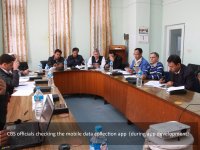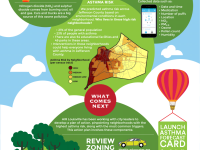The Usalama app is a platform that connects users and emergency service providers (ambulance, security, police, road-side assistance) in a quick and efficient manner, utilizing real-time user data, and an integrated web-based back-end portal.
Innovation Tag: Geolocation and Mapping
High transaction costs, long bureaucracy, and a weak controlling system create bad image of public services, especially in terms of forestry business. One Timber One ID (SIPUHH) is an innovation as a tool in controlling forestry business. It provides a system in which any timber traded has an ID, so its origin and legality can be identified. It promotes greater accountability on the timber industry to respect forestry law.
In April 2015, a 7.8 Mg earthquake hit Nepal that affected over 1 million households and 5.08 million people. Disbursement of reconstruction funds called for a massive door-to-door survey in order to identify true beneficiaries. For the first time, Nepal and the Kathmandu Living Labs deployed a team of 3,000 engineers armed with electronic tablets to collect 10 TB data and 10 million photographs from remote parts of Nepal in just over 120 days.
UNDP - Live Lebanon in collaboration with the Ministry of Public Works and Transportation, the National Council for Road Safety and MTV (media partner), introduced a new pothole patching technology called "Velocity" and launched a campaign called "Ensa Joura". whereby citizens can pinpoint potholes using a mobile application. The state of the art truck will go to the reported locations and instantly fix the potholes.
Case Study
MAGMA Indonesia (Multiplatform Application for Geohazard Mitigation and Assessment in Indonesia)
MAGMA Indonesia is an system that streamlines the process of geological hazard mitigation. It raises the bar on the standard of data monitoring and management for Indonesian government agencies. MAGMA digitizes relevant geological data into integrated databases, making them easier to analyze and use. Frequent readings and analytics can now be made ready in an almost-real-time manner. As a public service, MAGMA makes geological hazard mitigation and assessment available for free, anytime and…
The city of Louisville has one of the highest asthma rates in the U.S. AIR Louisville was a community program that used smart connected inhalers to help improve the asthma problem in Louisville. AIR Louisville enrolled 1,147 citizens of Louisville to improve asthma for everyone. Citizens benefited by receiving personalized care. Louisville Metro benefited from crowdsourced, hyperlocal data of air quality challenges our residents face.
The Poverty Stoplight (PS) seeks to activate the potential of families to eliminate multidimensional poverty beyond traditional income measures through a self-evaluation tool. PS is used by communities, businesses and governments to support families in assessing their poverty levels and implementing practical solutions, empowering the poor to be architects and protagonists in the process of eliminating poverty.


